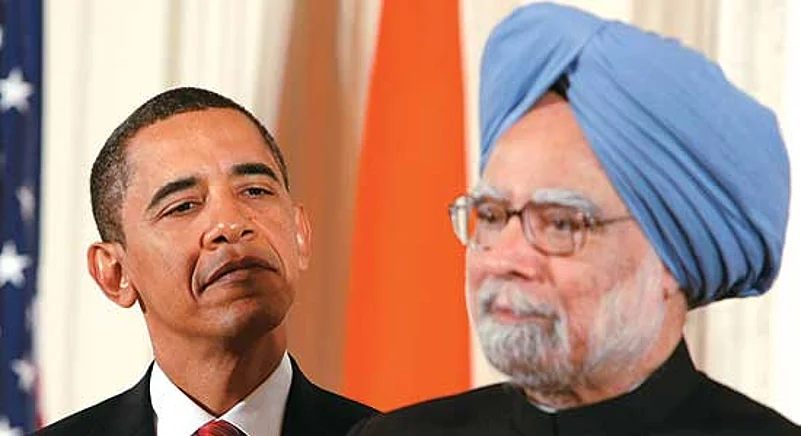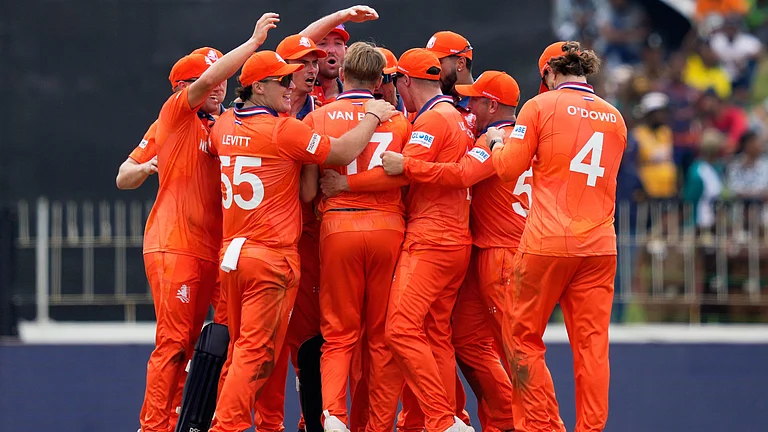The Alarm Bells
- No mention of India in any of Obama’s major foreign policy speeches, the latest being the one in Tokyo
- Travels to both Japan and China, but not to India, indicating a supervisory role for China in S. Asia
- Appears to have eased pressure on Pakistan to deliver on those involved in the attack on Mumbai
- Refuses the Indian investigating team access to Headley
- Renewed call for all countries, including India, to sign the nuclear NPT, anathema to New Delhi
- No smooth sailing for India being granted the right to reprocess nuclear fuel
***
The state visit of an Indian prime minister to the United States often becomes an occasion to celebrate, perhaps even to crow about. The celebration was predictably exceptional this time round, as Manmohan Singh was the first state guest of President Barack Obama. Yet, ironically, as the two leaders seek to engage in their “defining partnership for the 21st century”, many in the foreign policy establishment are asking the fundamental question: Is America a reliable partner? This question assumes importance because the world’s sole superpower has shown a penchant for using and ditching allies in accordance with its changing interests.
Says former foreign minister K. Natwar Singh, “We cannot be a natural ally to a nato country.” Singh is articulating the views of those in the foreign establishment who think a close partnership with the US can come only at the cost of alienating the countries (read Russia and its allies) against whom Washington had cobbled together the North Atlantic Treaty Organisation. “The next few days will show how high India figures on Obama’s radar,” adds Singh. The question, therefore, is: where does India figure in the Obama worldview?
The school of thought that tends to be wary of Obama says India has been missing from almost all the important policy statements the US president has been making over the last one year. For instance, India didn’t even get a cursory mention in Obama’s speech in Tokyo early November when he laid out the broad contours of America’s engagement with Asia. And though the Manmohan-Obama joint statement was tough on Pakistan, demanding that the perpetrators of 26/11 be brought to justice, there’s as yet no evidence of Washington leaning further on Islamabad to dismantle the terror infrastructure directed against India. Quite worryingly, the US investigating agencies refused to give their Indian counterparts access to David Coleman Headley, who was nabbed in Chicago for plotting attacks in the subcontinent. So much for the incessant talk about the Indo-US cooperation on counter-terrorism.
What has raised the hackles of this section, however, is Obama’s controversial joint statement with Chinese president Hu Jintao, which spoke of the two leaders being supportive of improvement in Indo-Pak relations. The statement, this school believes, conveyed the impression that America wants to accord a supervisory role to China in Asia, besides pulling India down to the same level as Pakistan. At one stroke, therefore, the hyphen was reinserted between India and Pakistan.
But the lobby that has an abiding faith in America’s love for India points to the many pluses accruing from Manmohan Singh’s visit to Washington. This school says Obama described India as a “nuclear power”—perhaps the first-ever for an American president—and heaped lavish praises on Manmohan Singh both as a leader and an economist and talked of India as a reliable partner for the US in meeting future challenges.
This contradiction between the two schools partly owes to the American political system, where a presidential election happens every four years. This compounds the problem in a country whose foreign policy bears the unmistakable stamp of the president, unlike, say, in India, where bureaucrats play a significant role in defining it. No wonder, the American foreign policy is remarkable for its lack of continuity. For instance, President Bill Clinton discovered India for America, paving the way for President George Bush to give New Delhi the primacy of place in Asia, underlined through the signing of the Indo-US nuclear deal. But now, with Obama replacing Bush in the White House, some of the old strains in Indo-US relations have resurfaced.
Some say it’s unrealistic for India to expect a Bush encore under the Obama administration. Bush extended a hand of friendship to India because of his worldview—the neo-cons in his administration, who were rather in sync with the hardliners in the Indian establishment, wanted to pit India’s economic and military strength to contain China. A slew of naval exercises in the Indian Ocean saw India, the US, Japan and Australia participating together.
But this emerging quadrangle unravelled following the change in leadership in Australia and Japan, and Obama’s determined efforts to engage China instead of isolating it. In Obama’s worldview, unlike Bush’s, China has a vital role to play in the new world order—Beijing’s cooperation is imperative not only for pulling the world out from economic recession, but also for strengthening the American economy. China is America’s creditor, and it fuels the gargantuan consumption of its citizens. In return, America knows it must give China geo-strategic space. This was the backdrop to the controversial joint statement that was interpreted as America conceding to China the supervisory role in Asia.
“It’s an evolving global scenario,” says a senior Indian foreign ministry official, “where no country is sure what shape the final order will take. And therefore, it’s not only India that needs to do a reality check, because we see even Obama doing a course correction after going overboard on China.” Unable to wrest concessions from China, and criticised at home for appeasing Beijing, Obama backtracked, quite manifest in his description of India as a nuclear power. This implicitly restored some parity between New Delhi and Beijing.
For, India, as the senior official points out, involves various dimensions. For one, it must pull its chestnuts out of the fire on its own, instead of routinely rushing to the US for assistance. New Delhi must also weigh its own interests and devise its China policy, particularly as Beijing’s global clout is likely to grow and expand faster than India’s. Third, as Indian policy planners say, New Delhi must understand that Washington needs India as much as New Delhi needs the United States. India’s expanding economy, its large army and blue-water navy, huge knowledge base and potential nuclear and defence markets make it an attractive destination for both the American companies as well as the US government for a sustained engagement. But for this to happen, India must understand its strengths. Know where it stands, and where it wants to go.

























